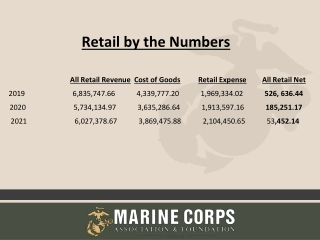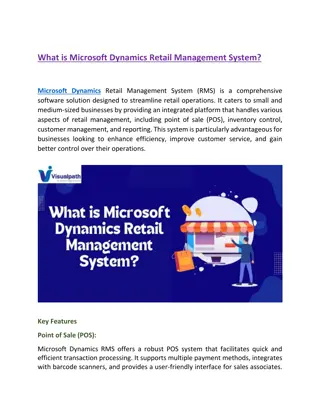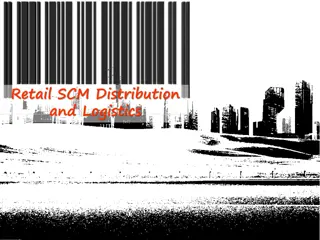
Insights into Skills and Challenges in Retail Sector - 2015 Report
"Explore the comprehensive research focusing on the retail sector, highlighting key trends, skills evolution, and challenges faced in the industry. Gain insights into workforce development, changing roles, and the impact of technology on retail operations."
Download Presentation

Please find below an Image/Link to download the presentation.
The content on the website is provided AS IS for your information and personal use only. It may not be sold, licensed, or shared on other websites without obtaining consent from the author. If you encounter any issues during the download, it is possible that the publisher has removed the file from their server.
You are allowed to download the files provided on this website for personal or commercial use, subject to the condition that they are used lawfully. All files are the property of their respective owners.
The content on the website is provided AS IS for your information and personal use only. It may not be sold, licensed, or shared on other websites without obtaining consent from the author.
E N D
Presentation Transcript
Sector insights Sector insights Skills and performance challenges in the retail sector Strategic Labour Market Intelligence - 2015
About this research The research focuses on the retail sector Identifies major trends affecting the sector and how skills will change in response Discusses current awareness of, engagement with and interest in National Occupational Standardsin developing the sector s workforce Identifies the outlook for jobs and skills Draws out the implications for skills supply and workforce development Investigates employers perceptions of the skills needs of key occupations and challenges faced in meeting these needs
About the retail sector Value added Workforce 90bn contributed to UK economy (2014) Turnover year-on-year growth since 2008 2012 higher than 2012 358.8 bn Over 3,000,000 employees, of whom almost two fifths are customer service assistants 2008 311.7 bn Online retailing is transforming the sector From 2012 to 2020, the workforce is projected to increase by 100,000 to 3.2 million Out of town shopping centres and hyper-markets have also altered the profile of the high street
Key occupations The research focused on five occupations Customer Customer Service Manager Service/Sales Assistant Ensuring that customers needs and expectations are satisfied; managing team of customer service assistants Providing help and advice to customers in all kinds of retail outlets SME Owner/ Manager Marketing Associate Professional Human Resources Manager Small business owners in overall control of all business operations Analysing information to help their employer/client make informed decisions Developing, advising on and implementing policies to deploy employees skills effectively
Changes within the sector Factors are driving change include: demographic shifts, environmental sustainability; new regulations; and the widespread integration of technology. Trends suggest increasing use of customer data and integration of online channels into business models Customer use of online retail and internet research means a changing role for the store Better informed customers increasingly visit stores for information and an improved experience Retailers online and offline platforms increasing linked Some stores used as a showroom as well as a retail space These changes mean retail employees need new skills in data-handling, ICT, and customer service Small businesses also need to respond to changes by investing in training, skills acquisition, and strategic planning
The skills situation in the retail sector Barriers to progression The sector offers vocational qualifications (mostly at levels 1 and 2) 29% Only 22% of the retail workforce holds a Level 4+ qualification 7 pp less than the national average. However there are high levels of reported over qualification among 20-24 year olds By 2022, L4+ qualifications will be a pre-requisite for 34% of retail jobs The proportion of managers in the workforce is set to rise by 7pp by 2020, and trends suggest that they will need training in a wider range of skills Progression opportunities on the shop floor are good for experienced workers. 22% quals at L4+ But there is high staff turnover, even among managers. Staff leave companies for relatively small increases in pay. 78% quals below L4 This may reflect a lack of awareness of, or desire to pursue, progression opportunities within the company Stakeholders report a lack of higher- level qualifications is impacting on employee progression and retention A small number of vocational qualifications in retail are at L4+. These higher level qualifications offer routes into mid level/managerial jobs
Training and skills gaps Employers are 9 pp more likely to offer induction training than the national average. However 60% of sector retailers offer training but Selected groups such as older workers and the self- employed are less likely to access training, but could benefit from it only 46% have a training plan only 25% have a dedicated training budget The proportion of workers over 55 who receive training is falling 18% of retailers report skills gaps 21% trained 8% trained 2012 2007 these employers attribute skills gaps to: ineffective training (40%) lack of motivation (40%) employee new to role (40%) employee performance not improved following training (40%) This poses a risk of skills gaps in a changing sector SME owner managers rarely access training, but may need support to develop management/retail skills
Skills challenges Skills that need improving to fill skills gaps include: There are also occupation specific challenges: customer service staff are increasingly required to use ICT, and understand new products and regulations SME owners need improved financial and business skills to remain competitive in a sector facing stiffer competition online marketing associates increasingly have to work with larger quantities of data HR managers require greater strategic oversight customer service managers need a wider understanding of a store s offering across all channels planning and organising skills 59% customer handling skills 55% technical and job specific skills 53% 49% of employers reported pressure to upskill linked to the development of new products or services 43% of employers reported pressure to upskill linked to new technology As the sector changes, it will require more from its workers. In some areas, it will be competing for IT and professional skills which are in demand across other sectors
Developing skills needs in a changing environment will require adjustment Demographic change will restrict the supply of younger workers entering the sector Demand for new and more advanced skills will continue to increase Net employment growth of 4% is predicted 2012 2022 This will create a replacement demand of over 2,000,000 workers Lower-level retail jobs are marked by high staff turnover, whilst negative perceptions of jobs in the sector can make it harder to attract graduates and professionals.
Changing skills profiles The five occupations face changing skills profiles Customer Service Staff Better knowledge and sales skills to engage and handle informed customers with other options online Customer Service Managers Active skills management abilities to train and motivate their staff to new standards SME Managers Market analysis, strategic and financial skills and multi-channel marketing Marketing Associates Advanced data-handling, integrating quantitative and qualitative data to produce sophisticated analytics HR Managers Strategic planning, talent management and relationship skills to meet future skills needs The sector will have to focus on retaining trained employees and attracting skilled professionals to meet these demands
Use of National Occupational Standards The UKCES Employer Perspectives Survey (2014) shows that: Employers which are not aware of NOS Retail and wholesale: 66% National Average: 60% Sector employers are less likely than average to be aware of NOS Smaller retailers are less likely to be aware of NOS However, employers may be using them indirectly as NOS are also used to inform vocational qualifications and apprenticeships 5 Survey data suggest NOS are most commonly used in staff appraisals, and developing job descriptions and training programmes Interviewees expressed interest in finding our more about how NOS could support staff development
There is scope for collaboration with schools and higher/further education The future will place greater skills demands on HR and Associate professionals & The skills and knowledge required of managers are increasing Retail will be competing for skilled workers with other more appealing sectors SO BUT There is a lack of retail qualifications at managerial level The sector needs to attract graduates and qualified workers If links are established with schools, colleges and universities Can communicate retail as a career option to young people Can develop more vocational qualifications Can link qualifications to managers skills needs Can get feedback on the job types and designs valued by education leavers Collaboration with education would help the sector to meet its needs and structure attractive career options
More focused training and job design would help to upskilling the sector workforce Sector employers need to continue to work together to: Sector employers need to continue to work together to: Upskill existing workers with training linked closely to skills needs, especially in rapidly changings fields such as data-handling and new technology, and in customer service Increase training amongst older workers and SME owners Review methods for assessing and responding to skills gaps Identify how to deliver appropriate training/skills support to SMEs Reduce the current under-utilisation of skills Recognise and develop skills potential, with jobs and progression routes that support employees to use their skills Skills Shops developed by the National Skills Academy for Retail. 50 throughout the UK, Offer retail related training Run individually by local stakeholders
To find out more: https://www.gov.uk/government/organisations/uk-commission-for-employment-and-skills info@ukces.org.uk @ukces






















